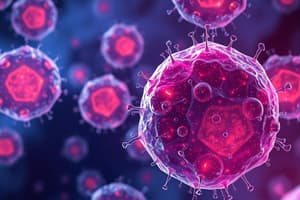Podcast
Questions and Answers
What is a potential outcome of deregulation in CD4+ T cell plasticity?
What is a potential outcome of deregulation in CD4+ T cell plasticity?
- Improved Treg function
- Increased risk of developing allergies
- Potential development of autoimmunity (correct)
- Enhanced immune response to pathogens
Which type of CD4+ T cell is primarily involved in immune suppression?
Which type of CD4+ T cell is primarily involved in immune suppression?
- Th1 cells
- Cytotoxic T cells
- Th17 cells
- T regulatory cells (Tregs) (correct)
What characteristic of CD4+ T cells allows the immune system to respond to environmental changes?
What characteristic of CD4+ T cells allows the immune system to respond to environmental changes?
- Maturation
- Anergy
- Differentiation
- Plasticity (correct)
Which factor might be targeted for immune therapies in autoimmune diseases?
Which factor might be targeted for immune therapies in autoimmune diseases?
What role do mucosal tissues play in T cell plasticity?
What role do mucosal tissues play in T cell plasticity?
What is a major concern regarding the flexibility of Th17 cells?
What is a major concern regarding the flexibility of Th17 cells?
What mechanism is primarily responsible for Treg induction?
What mechanism is primarily responsible for Treg induction?
What could be a focus of research using humanized mouse models?
What could be a focus of research using humanized mouse models?
What role do Tregs play in immune suppression according to the research findings?
What role do Tregs play in immune suppression according to the research findings?
Which of the following techniques is suggested for future research into CD4+ T cell plasticity?
Which of the following techniques is suggested for future research into CD4+ T cell plasticity?
What is a potential outcome of manipulating Th17 and Treg homeostasis?
What is a potential outcome of manipulating Th17 and Treg homeostasis?
What is currently limited regarding the understanding of Th17 cell differentiation?
What is currently limited regarding the understanding of Th17 cell differentiation?
How do Th17 cells contribute to immune responses?
How do Th17 cells contribute to immune responses?
What potential therapeutic approach is suggested for treating human diseases?
What potential therapeutic approach is suggested for treating human diseases?
What types of influences are anticipated to be considered in future research?
What types of influences are anticipated to be considered in future research?
What mechanism allows for Th17 cells to become non-pathogenic?
What mechanism allows for Th17 cells to become non-pathogenic?
What is primarily driven by ATP in the context of Th17 cell differentiation?
What is primarily driven by ATP in the context of Th17 cell differentiation?
Which factor is known to mediate and restrain inflammation in the immune system?
Which factor is known to mediate and restrain inflammation in the immune system?
Which biological process promotes experimental autoimmune encephalomyelitis through proinflammatory T-cell responses?
Which biological process promotes experimental autoimmune encephalomyelitis through proinflammatory T-cell responses?
Which of the following statements regarding autoimmune disease therapies is correct?
Which of the following statements regarding autoimmune disease therapies is correct?
What role do humanized mouse models typically serve in research?
What role do humanized mouse models typically serve in research?
What is a significant characteristic of Th17 cell responses in autoimmune diseases?
What is a significant characteristic of Th17 cell responses in autoimmune diseases?
Which cytokine is primarily associated with the differentiation of Th17 cells?
Which cytokine is primarily associated with the differentiation of Th17 cells?
Which of the following factors is NOT typically associated with the promotion of Treg cell differentiation?
Which of the following factors is NOT typically associated with the promotion of Treg cell differentiation?
Flashcards are hidden until you start studying
Study Notes
CD4+ T Cell Plasticity
- CD4+ T cell plasticity refers to the ability of Tregs and Th17 cells to adapt and change their function based on environmental cues, crucial for immune response flexibility.
- Promising data from animal studies indicates that it may influence Th17 and Treg homeostasis, promoting immune suppression by inducing Tregs and converting Th17 cells into non-pathogenic forms.
Research and Future Directions
- Current understanding of CD4+ T cell plasticity's role in autoimmune diseases and cancer remains limited.
- Future research utilizing advanced techniques, like humanized mouse models, is expected to yield significant insights into this field.
- Genetic and environmental factors are essential considerations for studies relating T cell plasticity to human diseases.
Therapeutic Implications
- Targeting factors that regulate Treg and Th17 plasticity presents potential avenues for immune therapies in cancer and autoimmune diseases.
- Manipulation of the gut microbiota is suggested as a promising therapeutic strategy for treating autoimmune conditions.
Immune System Reaction
- CD4+ T cell plasticity has evolved to maintain a balance between elasticity and stability, allowing for swift immune reactions to pathogens.
- However, this plasticity can pose risks, as dysregulation may lead to autoimmune diseases due to inappropriate immune responses.
Mechanisms of Control
- Various mechanisms have evolved to regulate T cell plasticity, particularly at mucosal tissue interfaces where environmental changes are critical.
- Understanding these regulatory mechanisms is fundamental to developing therapies aimed at manipulating the immune system effectively.
Acknowledgments and Support
- Research was supported by National MS Society grants, NIH grants, and various foundations, showcasing collaboration in advancing immunology studies.
Studying That Suits You
Use AI to generate personalized quizzes and flashcards to suit your learning preferences.



